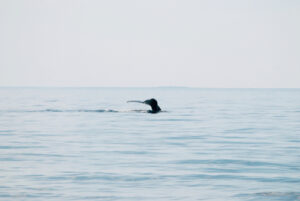
Federally proposed speed restrictions for boats ranging in length from 35 feet to 65 feet won’t help save North American right whales, say U.S. Reps. Buddy Carter (R-GA) and Nancy Mace (R-SC).
“We all want to protect the right whale from extinction, but this is the wrong way to do it,” said Rep. Carter on June 27. “Before implementing a sweeping rule that will kneecap small businesses up and down the East Coast, including 27,000 in Georgia alone, we must use all of the technological advancements at our disposal so that right whales and business owners can thrive together.”
The two leading threats to the survival of right whales are vessel strikes and entanglement in fishing gear, according to the International Fund for Animal Welfare, which estimates there are fewer than 340 right whales remaining in the population.
The National Oceanic and Atmospheric Administration (NOAA) in July 2022 proposed speed restrictions to further protect right whales from death and serious injuries resulting from collisions — part of its multifaceted approach to stabilize and recover this endangered population.
If enacted, the NOAA’s changes would expand the current mandatory seasonal speed restrictions of 10 knots or less in designated areas of the ocean and extend to most vessels measuring 35 to 65 feet in length.
Rep. Carter on June 23 introduced the bipartisan Protecting Whales, Human Safety and the Economy Act of 2023, H.R. 4323, with four original cosponsors, including Rep. Mace and U.S. Rep. Mary Peltola (D-AK), after boaters, harbor pilots, and business owners raised concerns that the NOAA’s regulations would pose safety risks for commercial vessels, threaten up to 340,000 American jobs, and negatively impact nearly $84 billion in economic contributions, according to a bill summary provided by the lawmakers.
Specifically, H.R. 4323 would delay funding for the NOAA’s proposed restrictions until the U.S. Department of Commerce can fully implement new monitoring systems for right whales, the summary says.
“While it is important to protect the majestic right whale from extinction, we must also consider the safety risks posed to commercial vessels and the significant impact on jobs and the economy in South Carolina,” Rep. Mace said.
According to NOAA’s own data, she said, the chances of a recreational vessel striking a right whale are extremely low, and boats under 65 feet have accounted for just five whale strikes since 2008.
“It is essential to strike a balance which ensures both whale conservation and the well-being of our maritime industries,” said Rep. Mace.
The American Pilots’ Association, the Center for Sportfishing Policy, the Congressional Sportsmen’s Foundation, and the American Sportfishing Association endorsed H.R. 4323.



